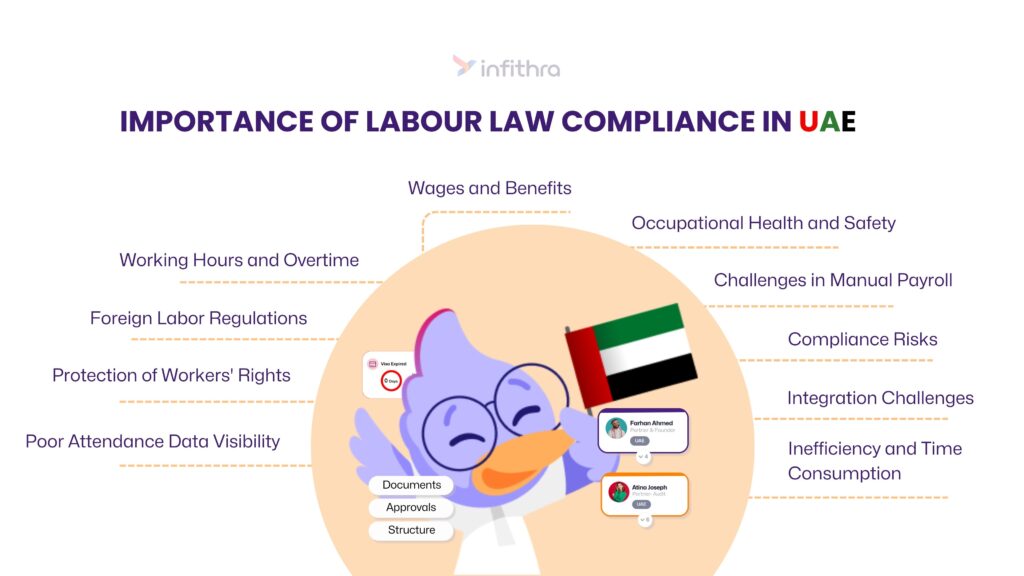As a global business evolves, it’s essential for companies to pay close attention to regulatory compliance. The UAE, situated in the Middle East presents significant growth opportunities due to its robust economy and strategic position. However, alongside these opportunities come intricate rules and legal obligations that businesses need to navigate carefully to uphold high ethical and legal standards.
Today, the rules and regulations around labor law practices in UAE are numerous and strict, making the stakes high for businesses and employers. It’s crucial for companies to comply with these intricate regulations as any oversight can potentially result in legal troubles. Managing employee attendance becomes a complex task, especially when navigating through various labor laws across the Emirates. The need for accuracy in tracking attendance becomes even more important in these scenarios. The impracticality of HR having to monitor every employee’s actions adds further complexity when calculating working hours, breaks, public holidays, and more. In response to these challenges, businesses opt for time attendance systems. These systems offer a reliable and automated solution to navigate the complexities of attendance tracking, ensuring the company follows all the necessary rules and regulations.
Here are some key aspects of the role of compliance with labor laws and regulations in the UAE:

1. Protection of Workers’ Rights:
Labor laws in the UAE are designed to safeguard the rights of workers. This includes provisions related to working hours, wages, leave entitlements, occupational health and safety, and other aspects relating to their employment.
2. Foreign Labor Regulations:
In 2024, approximately 9.06 million people working in the UAE comprised expats, taking up a significant 88.52% of the entire population. Most of the GCC countries heavily rely on expatriate labor. Compliance with labor laws is essential to regulate this influx of foreign workers, define their rights and responsibilities, and prevent any exploitation or abuse in the workplace.
3. Working Hours and Overtime:
Labor laws in the UAE typically specify the standard working hours, rest days, and overtime provisions. Employers are required to adhere to these regulations to ensure that employees are not overworked and are compensated appropriately for additional hours.
4. Wages and Benefits:
Compliance with regulations related to wages, bonuses, and other benefits is important for maintaining a fair and transparent work environment. Labor laws often stipulate minimum wage levels, timely payment of salaries, and benefits such as health insurance and housing allowances.
5. Occupational Health and Safety:
The GCC countries are increasingly recognizing the importance of providing a safe and healthy working environment. Compliance with occupational health and safety regulations is essential to protect workers from hazards and prevent workplace accidents.
Manual time and attendance systems, reliant on employees recording their work hours through physical time cards or logbooks, present many challenges for organizations. In the absence of automated tracking mechanisms like biometric systems, these outdated methods of attendance monitoring are vulnerable to various issues, such as limitations in accuracy and effectiveness, security concerns, and compliance risks.
Here are 5 common challenges companies in the UAE often face with manual time and attendance management systems:
6. Challenges in Manual Payroll:
Errors in payroll can occur when employees forget to clock into work accurately, leading to potential overpayments or underpayments with their salary. These inaccuracies can have a dual impact on both employee morale and company overhead. Employees may feel dissatisfied if they receive less pay than expected while the company faces financial discrepancies. Ensuring accurate timekeeping is crucial for maintaining a harmonious work environment and financial stability.
7. Compliance Risks:
Managing attendance and time through manual methods poses significant challenges in adhering to UAE labor laws and regulations, especially considering the frequent changes within the region. This can be related to working hours, overtime, and public holidays. Failure to comply with these regulations may lead to legal consequences and financial penalties. In this case, employers must adopt efficient and accurate payroll systems like infithra to ensure compliance with the law, avoiding potential legal issues and any financial setbacks.
8. Inefficiency and Time Consumption:
The process of collecting, reviewing, and calculating attendance data manually is time-consuming and can result in several delays in processing payroll runs. This inefficiency not only hampers productivity within HR and Finance teams but also increases the likelihood of human errors. Automating time and attendance management through modern HR applications can address these challenges, streamlining the entire process and ensuring accuracy while saving valuable time for both employees and administrative staff.
9. Poor Attendance Data Visibility:
Juggling between multiple HR management systems and tools can result in real-time visibility gaps caused by data silos. Additionally, attendance tracking across multiple systems poses significant challenges. Without a unified and streamlined approach, it becomes difficult to monitor time and attendance for all your employees. The delay in accessing up-to-date attendance data makes it challenging for organizations to respond swiftly to workforce needs which can impact overall operational efficiency.
10. Integration Challenges:
Integration challenges in attendance and payroll management arise when disparate systems fail to seamlessly communicate and share data. The lack of integration often leads to inefficiencies, increased workload, and potential errors in processing payroll, impacting both the HR team and employees. Establishing a robust integration framework is essential to streamline these processes, ensuring accurate attendance tracking and facilitating smooth payroll management, contributing to organizational efficiency and employee satisfaction.
Conclusion
Navigating time and attendance in the UAE is a critical aspect of managing a business in compliance with the intricate labor laws and regulations. The protection of workers’ rights, adherence to foreign labor regulations, and compliance with standards related to working hours, wages, benefits, and occupational health and safety are paramount for a transparent and ethical work environment. Manual time and attendance systems pose significant challenges, including payroll errors, compliance risks, inefficiency, poor data visibility, and integration issues. To overcome these challenges and ensure smooth operations, businesses are increasingly turning to automated time and attendance software solutions like infithra.
By embracing modern HR software in the UAE, companies can streamline the attendance tracking process, reduce errors, and ensure compliance with labor laws. This not only enhances efficiency but also contributes to employee satisfaction and overall organizational success. In the dynamic business landscape of the UAE, adopting automated systems is a strategic move to stay ahead, maintain accuracy, and uphold the high standards required in the workforce management.


Leave a Reply